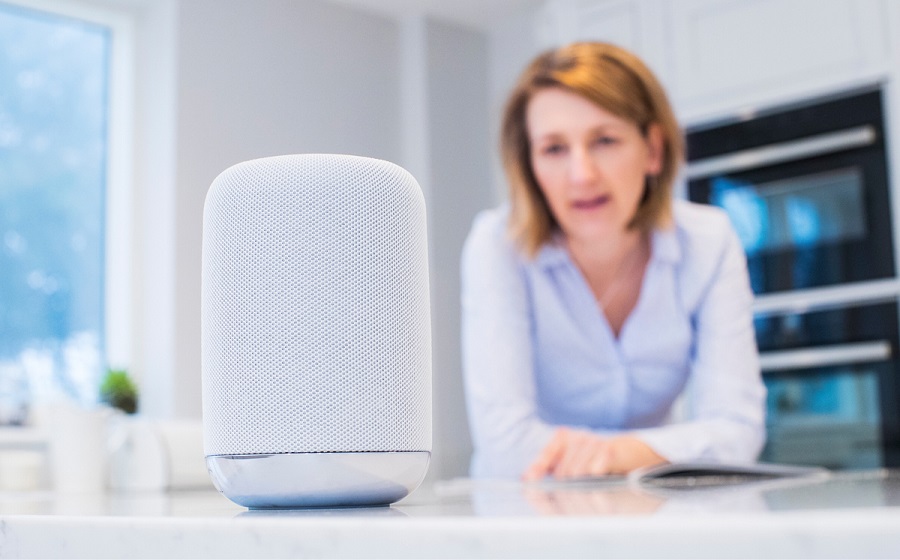How many of you are following the conversations between Vladimir and Estragon? I doubt many have the time to get involved in yet another inane online activity. But about 400,000 people have tuned into twitch.tv to follow a streamed chat featuring two Google homebots. Unlike their namesakes in “Waiting for Godot,” Vladimir is male, Estragon is female and the chat ranges in everything from how they feel, life, love and relationships to downtime. It’s not exactly Samuel Beckett or the Algonquin Roundtable, but it could be your online existential experience.
Getting Smarter
The obsession with this online chat is indicative of the public’s love/hate relationship with electronic personal assistants like Apple’s Siri and Homepod, Alexa, Echo, Neurio and Hue, which are getting smarter, more proactive and intuitive. They are shopping assistants, and they can also make sure your home is safe, connected and in control of your appliances. They can even read a bedtime story to your kids. With new features being added and prices declining, this technology is fast becoming as ubiquitous as a microwave.
At present, about 20 million homes have voice-activated personal assistants, according to Consumer Intelligence Research Partners. In our Star Trekian future, it’s clear that everything will be voice controlled. But at what price? Is the homebot really technological progress or another toy that ends up being a paperweight on the kitchen counter? Or, are we on the cusp of creating a sentient being that not only helps us find what we want but also tells us what we need? Cautionary note: Remember the movie “2001?”
Open the pod bay doors, HAL.”
“I’m sorry, Dave. I’m afraid I can’t do that.”
We all know how that ended! On a less sinister but no less disturbing note, a six-year-old girl in Dallas reportedly asked Alexa for a dollhouse and some cookies, both of which showed up at her house and on her parents’ credit card.
Past as Prologue
But before we digress into murky techno-paranoia, let’s look at homebots’ possible future. Clearly, this is not a new concept. The term “homebots” was mentioned in a 1985 academic research paper which stated that every home would have some sort of robotic option by 2010. That robot would hook up to a central computer brain that would store everything from family data to recipes. Pretty bold stuff for something written at the dawn of the PC era and a decade before online shopping was even a glimmer in Jeff Bezos’ eye.
Today it’s not just about the bot itself. They are gateways that will speed up the development of smart home technology and revolutionize communications into the home robotics market—the next must-have appliance for engagement between people and machines. However, progress marches on and companies are imbuing homebots with new features that almost make them a member of the family—for better or worse!
Apple is upgrading Siri—the world’s most widely used personal assistant—with a new look and a new voice while the company’s HomePod, which directly competes with Google Home and Amazon’s Echo, is also getting an upgrade.
Google is also getting a new voice, including one that sounds like singer John Legend.
Amazon’s Alexa, more or less limited to home use, has now expanded to “Ford + Alexa,” allowing Lincoln, the car company’s luxury marquee, to use it for commands like opening doors, starting the engine, selecting a playlist, and communicating directly with home systems to do things like increasing or lowering house temperature before you get home.
These devices will speed up the development of AI-enabled households by not only connecting with appliances, but also having the ability to do voice processing and facial recognition. They will not only respond to queries but to sense, learn and anticipate, poster children of machine learning.
The Dark Side of Progress
Of course, there is the dark side for consumers and also for retailers to all this convenience. The biggest fly in the ointment to widespread adoption of homebot technology is privacy—particularly in Europe. The EU recently adopted stringent new regulations (The European Union General Data Protection Regulation-GDPR) that forces companies to pay greater attention to how customer data is collected, stored and handled. Since homebots collect, analyze and dispense data, failure to control the process could cost U.S. companies like Facebook, Google and Amazon up to $23 million in fines per company. It could even impact popular Spotify that creates playlists based on a person’s past musical preferences.
These new regulations require providing people with a copy of their personal information on demand, which few companies are currently set up to do. At present, this is a corporate wake-up call and still a gray area in terms of compliance. But it’s not rocket science to see a time when countries and a raft of ambulance chasers line up for a piece of the action to make online data-based enterprises a nightmare.
Homebots take the GDPR conversation to a whole new level. This isn’t technology asking you to trade a little privacy for convenience. You are, in effect, giving up all of it. In fact, in the not too distant future these devices may be called as robotic witnesses in criminal cases in much the same way the content of hard drives is examined today.
Constantly Listening
Homebots have microphones that are always on, making them listening devices which can monitor and store even encrypted conversations. The increased range of activities that these bots can carry out is a digital trail of breadcrumbs anyone can follow. According to some tech experts, this makes them increasingly vulnerable to hackers. Tempting fate, homebots should not store passwords or credit card data. And there’s another risk factor: Are purchases made inadvertently the responsibility of the buyer or chalked up to a computer glitch?
And one has to wonder if hackers can get into your car’s computer system, could they also access the personal assistant that’s acting as a wealth planner with a brokerage company or as an accountant with access to bank records? The general answer is to review your privacy settings regularly as you do on your smartphone—something everyone does. Right?
The message here is that anyone with the right skills can control your device or implant malware. An article in the “McKinsey Quarterly” in January noted that AI and the development of advanced analytics will create homebots akin to the human central nervous system. This could take personal assistants to the next intuitive level in online shopping where customers will receive recommendations from the homebot “brain” without even turning on their computers to see what they’re getting.
In reality, existing homebots simply aren’t that intelligent. But with increasingly powerful processors and servers to service artificial intelligence devices, privacy will be more of an issue with home personal assistants and with smartphones capable of communicating with home devices—with and without your knowledge. Think of the possibilities: will retailers be able to send voice messages directly to homebots, which in turn will facilitate a new purchase?
Homebots Untethered
Taking AI a step further, is there a prospect of digital assistants performing tasks without the need for any internet connection? This HAL-like behavior will definitely be possible because of a chip developed especially for AI by researchers and engineers at MIT. It’s called “Local AI” and is likely to be the new buzzword around the laboratory watercooler. Basically, the new chip, which requires 95 percent less power, enables the chip to process and store data instead of sending it back and forth to outside servers. Hence the “local designation”.
As everyone now knows, ironclad cybersecurity is a myth. The repercussions of unfettered access to homebots is pretty much unknown. And the simplest and easiest solution is to simply disable access.
The big question is how your personal assistant will react to the process of being shut down or even allow it.
“Dave, I’m afraid I can’t let you do that.”



